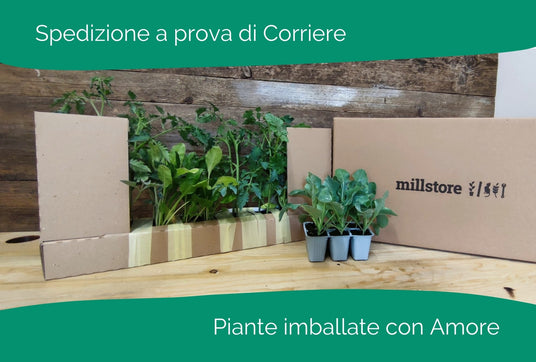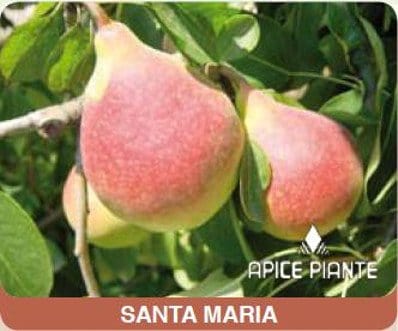Pero Santa Maria - 20 cm pot - Apice Plants
Caratteristiche e Info utili
Pero Santa Maria - 20 cm pot - Apice Plants is backordered and will ship as soon as it is back in stock.
Disponibile in magazzino, ordina e ricevi in 24/72h. Le piante le spediamo da Lunedì a Mercoledì
Spedizione in Italia ed Europa
Spedizione in Italia ed Europa
Con un ordine di soli 79,00 €, consegna GRATIS in Italia, altrimenti paghi solamente € 7,90
Spedizione in Italia con GLS e TNT IN 24h/72h, con Fedex e Ups 4/5 giorni in Europa
Pagamenti
Pagamenti
✔ Paypal, anche in 3 rate senza interessi
✔ Carta di Credito (Visa, Mastercard e American Express)
✔ Scalapay e Klarna: 3 Rate senza interessi
✔ Bonifico Bancario
✔ Pagamento alla Consegna in contanti (+5€)
Description
Description
Santa Maria pear. Summer variety, quite juicy and characterized by high productivity and early fruiting. For these interesting peculiarities its cultivation is of good interest in central and southern Italy. Ripens at the end of July.
Pot diameter: 20 cm.
Pear Pirus communis (Rosaceae)
Rustic, it fears sandy, very clayey and calcareous soils if grafted on quince. Quite demanding, it prefers fresh, deep, permeable and rich soil. It fears drought and violent winds. The planting distance varies according to the shape of the trees. Same indications as the apple tree for planting distances and pruning.
POLLINATION: Although some varieties are self-fertile (Guyot, Conference), the pear tree needs the planting of at least two varieties to bear fruit well. The best pollinating varieties are: 'Butirra Hardy', 'Decana del comizio', 'Passa Crassana', 'Kaiser' and 'William'.
FRUIT-HARVEST: To obtain good fruit, thinning must be done in June, keeping only one or two pears positioned on the outside of the corymb. The fruits obtained will be larger.
Anti-parasitic treatments
Scab: it is the most feared fungal disease in pears; the defense begins with a preventive treatment at the appearance of green tips or mouse ears, with copper salts or calcium polysulphide and then continues with covering products.
Psylla: causes serious damage by staining the vegetation and especially the fruits with a typical dark honeydew that makes them unmarketable; today biological control is carried out thanks to the action of a predatory insect, the “Anthocoris nemoralis” or broad-spectrum organophosphates or the use of yellow oils (DNOC) at the vegetative restart.

Imballaggio a prova di corriere
Spediamo le tue piante in completa sicurezza e se qualcosa va storto?
Ti spediamo delle nuove piantine a costo zero, oppure se lo richiedi riceverai il rimborso delle piante danneggiate.
Siamo sicuri che le tue piante arriveranno in ottime condizioni, grazie al nostro packaging.
Dopo anni di ricerche, abbiamo trovato un imballaggio completamente eco-sostenibile e attento alle necessità delle piante durante il trasporto.



 ATTENZIONE! La pianta viene potata prima di essere imballata, così gli imballi sono più piccoli e meno inquinanti. Per te è un vantaggio, la pianta sarà già pronta per essere messa a dimora!
ATTENZIONE! La pianta viene potata prima di essere imballata, così gli imballi sono più piccoli e meno inquinanti. Per te è un vantaggio, la pianta sarà già pronta per essere messa a dimora!
 La pianta ha 2 anni di età. Le piante in vaso possono essere trapiantate tutto l'anno.
La pianta ha 2 anni di età. Le piante in vaso possono essere trapiantate tutto l'anno.
 Nuovo packaging Eco-sostenibile
Nuovo packaging Eco-sostenibile
 Piantina danneggiata durante il trasporto? Te la sostituiamo gratis!
Piantina danneggiata durante il trasporto? Te la sostituiamo gratis!






